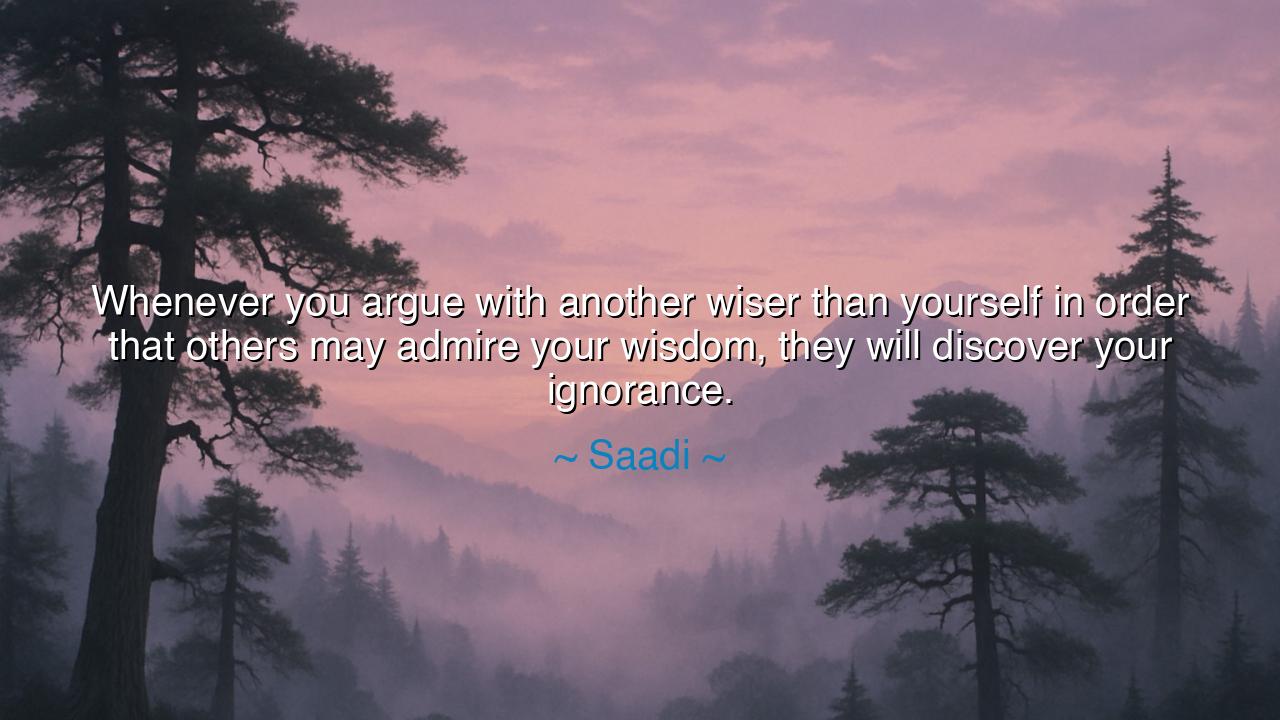
Whenever you argue with another wiser than yourself in order
Whenever you argue with another wiser than yourself in order that others may admire your wisdom, they will discover your ignorance.






“Whenever you argue with another wiser than yourself in order that others may admire your wisdom, they will discover your ignorance.” These words from the great Persian poet Saadi cut to the heart of a profound truth that echoes across the ages: wisdom is not born from the desire for admiration, but from the humility to learn and grow. To engage in argument for the sake of boasting one’s own wisdom is to court failure, for true wisdom is never paraded for others’ applause — it is humbly lived, quietly practiced, and often only revealed in the silence of reflection.
The ancients knew well that wisdom is not a badge to be worn on the chest, but a quiet force that speaks through action, through patience, and through understanding. The great philosopher Socrates, whose life was defined by his dedication to questioning and seeking truth, famously declared, “The only true wisdom is in knowing you know nothing.” In this recognition, Socrates understood that wisdom grows from the fertile soil of humility, not from the boastful efforts to win admiration or to best others in argument. His teachings remind us that those who claim to have all the answers are often blind to their own ignorance.
Consider the tale of the Emperor Qin Shi Huang, the first Emperor of China. His ambition was grand, and his desire for wisdom and power led him to surround himself with scholars, seeking advice from those wiser than him. Yet, driven by his fear of losing his status and legacy, he sought to outshine even the wisest of minds, demanding answers that flattered his ego. His desire to be revered led him to pursue immortality and to burn books of knowledge that didn’t suit his vision. In the end, his pursuit of admiration only led to his downfall, as his actions revealed the deep ignorance that lay beneath his power.
The great Sufi mystic Rumi also understood that wisdom comes not through boasting, but through the quiet surrender of the self to truth. His poetry speaks of the path of the seeker, who listens more than he speaks, and who seeks truth not to win favor, but to be transformed. Rumi’s teachings were not intended to impress others, but to guide them toward the wisdom that arises from love and understanding. It is in stillness and reflection, not in the heated clamor of arguments, that true wisdom reveals itself.
Thus, Saadi’s words call us to examine the motives behind our words and actions. The wise do not argue for the sake of showing off, for they know that wisdom is not something to be flaunted, but something to be lived. To argue with the aim of impressing others is to expose one’s ignorance, for the wisdom of the world is not measured by how loudly we speak, but by how humbly we listen and learn.
Let us remember, as the ancients did, that the pursuit of wisdom is not a competition, but a lifelong journey of self-awareness and quiet growth. May we strive not to be seen as wise by others, but to be ever more attuned to the subtle truths of life, so that our wisdom may be recognized not in words, but in the way we live.






L7Le Anh Vu lop 7A4
Saadi’s words make me think about the nature of true wisdom. Is wisdom only found in what we say, or is it more about how we listen and learn from others? When we argue for the sake of admiration, we risk losing the chance to learn from someone wiser. I wonder if this is a behavior that’s learned over time, or if it’s just part of human nature to want validation in our intellect.
LDLong Doan
This quote really challenges the way we approach debates and discussions. It’s so easy to get caught up in wanting to appear knowledgeable, but in doing so, we often undermine ourselves. I’ve seen people get defensive in arguments to protect their image, and it just makes them seem less wise. How do we strike the right balance between sharing knowledge and staying humble? Can we truly engage in meaningful discussions without letting ego interfere?
NVThong Nguyen Van
I love how Saadi highlights the danger of arguing with the intent to impress others. It’s almost like a self-defeating cycle—when we try to appear wise, we risk showing our ignorance. In a way, this makes me reflect on how often I engage in conversations. Am I more interested in listening and learning, or am I trying to make myself look knowledgeable? It’s a good reminder to focus on understanding rather than performing.
CLChi Linh
This quote resonates with the idea that humility is a cornerstone of wisdom. It’s tempting to argue just to showcase what we know, but in doing so, we often end up looking foolish. It makes me wonder if this kind of behavior is a reflection of insecurity. Why do you think people feel the need to argue to gain admiration? Is it just about ego, or is there something deeper at play here?
TTThai Thi Thuy tien
I find this quote quite humbling. It’s a reminder that true wisdom doesn’t come from proving others wrong, but from listening and learning. When we argue to impress others, we risk exposing our own flaws. Do you think this happens more often in intellectual or emotional debates? I’ve noticed that the more I try to “win” an argument, the more likely I am to miss out on the opportunity to grow from the conversation.